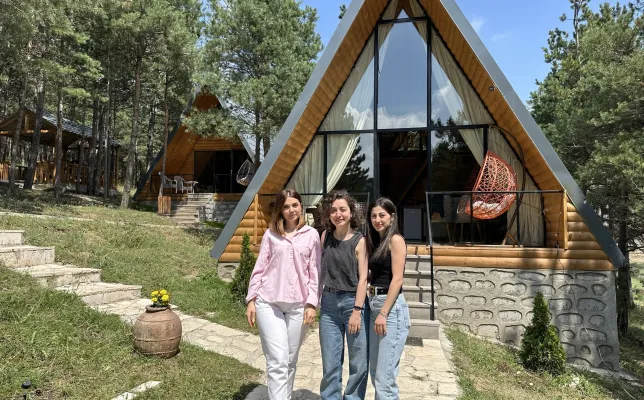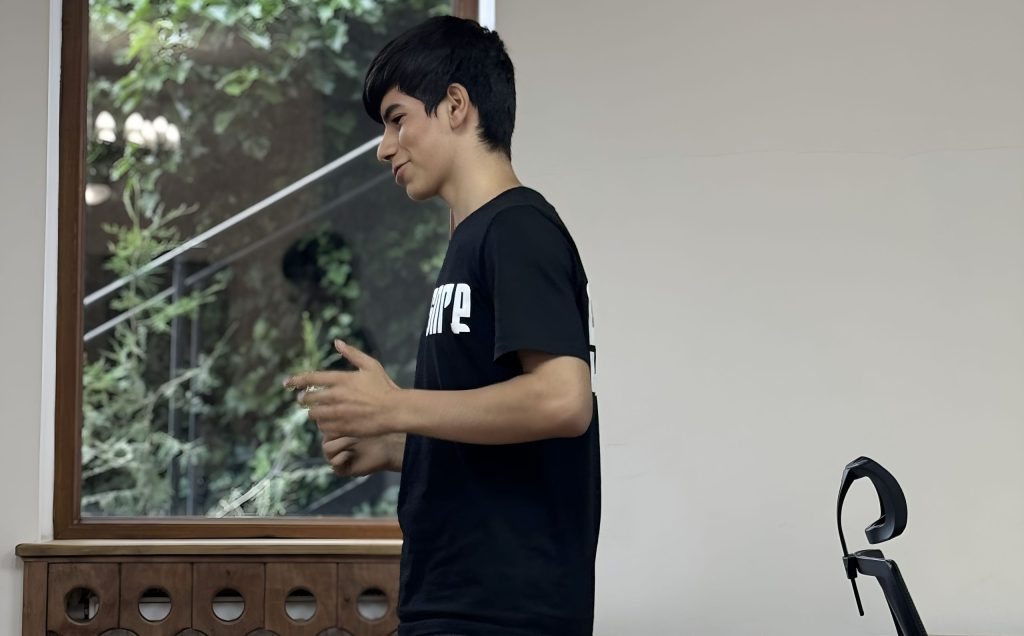From eco-manufacturing to modern beehives: empowering young entrepreneurs to transform their communities in Armenia

Syunik is a tense border region in southern Armenia, which has witnessed over 100,000 people passing through it from Nagorno-Karabakh after the 2020 war. In this environment of uncertainty, young people often hesitate to stay in the region and invest in long-term projects. However, thanks to the local NGO Impact Hub Syunik, a member of the global Impact Hub network, entrepreneurial spirit is taking root. The regional EU4Dialogue initiative, funded by the EU and implemented by the UNDP, has helped the organisation to equip young minds with the necessary skills, knowledge and resources to launch their own businesses and transform the communities they live in.









When Impact Hub arrived in the region in 2022, the concept of incubation and long-term business development support was largely unfamiliar to local youth. Most local NGOs focused primarily on financial aid, overlooking the importance of skills development and building an entrepreneurial ecosystem. “Unlike many traditional business support initiatives that provide direct funding, we believe in long-term impact through training, mentorship and networking opportunities,” says Raisa Aghabekyan, Impact Hub Syunik Programme Manager. Another major hurdle the NGO found was the limited entrepreneurial mindset among young people. “In our meetings with over 500 young people, only about 6% of them said that they had business ideas, which was critically low.” she recalls.
Ideas begin to take shape
To address these gaps, Impact Hub Syunik organised five pre-incubation workshops for over 250 young participants, including displaced individuals from Nagorno-Karabakh. These workshops focused on local challenges as entrepreneurial opportunities. “These young people live in remote villages with limited resources. Most of their ideas tend to solve social or environmental issues, which is great,” says Raisa. “However, they often overlook how to make their initiatives financially sustainable. Our role is to guide them in generating ideas that not only benefit their communities but also ensure long-term viability.” The sessions introduced social entrepreneurship, business idea generation and available support mechanisms. Many participants, new to entrepreneurship, left with multiple business ideas and newfound confidence in their potential as change-makers.
The backbone of the Foundation’s initiative lies in its hands-on coaching and mentorship. Silva Mesropyan is one of the four coaches who closely followed the 37 selected participants through the four-month incubation phase. This phase provided comprehensive support, including workshops on business planning, value proposition, resource management and marketing, culminating with the pitching event. Individual coaching sessions and mentoring helped the participants overcome personal challenges and validate their projects.
In July 2024, the final pitching event marked a major milestone for Impact Hub Syunik: 29 participants confidently presented their business models, market fit and impact potential to an independent jury. After a rigorous evaluation, ten winners – including four displaced from Nagorno-Karabakh – were awarded $1,000 each in seed funding to scale their ventures.








“What I find most rewarding is seeing the participants’ confidence grow,” says the coach. “At the beginning, they were hesitant and unsure. By the end, they were pitching ideas with passion and clarity. This transformation is what makes these initiatives so crucial for the future of Syunik.”
Success stories in action
Among the pitching winners is Ashot Baghdasaryan (20) from Karahunj in the Goris Municipality. Together with his friend Levon Asatrian, he turned an environmental concern into a business. “We saw a huge problem with plastic recycling and decided to create a 3D printing studio that recycles plastic bottles received from three Goris restaurants into environmentally friendly printing material,” says Ashot. “At first, it was difficult to convince people, but thanks to the support from Impact Hub Syunik, we built a viable business model. Now, we receive orders from various industries, especially automotive where 3D-printed parts offer a cost-effective alternative to imports.” Today Ashot’s business is growing: the earned money was reinvested into a new 3D printer and other equipment.
For Abgar Abgaryan (38), a displaced entrepreneur from Nagorno-Karabakh, the training programme provided a path to rebuild his life in Syunik. “Back home, we were beekeepers,” says Abgar. “When we relocated, we had to start from scratch. Thanks to the seed funding, my father and I were able to buy an ‘angle cutter’ machine, essential for manufacturing innovative beehives that largely simplifies beekeeping. Now, demand for our hives is growing,” he says. “Without this support, we might have had to leave Syunik in search of other opportunities.”






Another inspiring story comes from Diana Ghevondyan (25) from Goris. With the $1,000 award from Impact Hub Syunik, she made her family hospitality business in the Harzhis village eco-friendly. “At first, we didn’t know where to start. The coaching sessions helped us to refine our business model and improve our marketing strategy. Winning the grant allowed us to install a solar panel, solving the critical issue of hot water supply for our guests, as the village does not have access to gas,” Diana explains. Today, her wooden guesthouses attract travellers from around the world, including Australia! Listed on Booking.com and Instagram, her business is not only growing but also inspiring others in Syunik to launch their own tourism ventures.
A lasting regional impact
Beyond individual success stories, the NGO fosters a sense of community and collaboration among young entrepreneurs. “It’s not just about the funding,” notes the Programme Manager. “It’s about creating a network of young entrepreneurs who continue to inspire and learn from one another.” As Impact Hub Syunik looks to the future, it remains committed to supporting young entrepreneurs in the region with new projects and funding opportunities.
Border regions like Syunik are particularly vulnerable, making economic empowerment essential to retaining young talent and strengthening communities. “I’m impressed by the remarkable energy and responsibility of Syunik’s young people. The success of their projects inspires us to continue support, helping to harness their full potential for regional development,” concludes Silva Mesropyan.